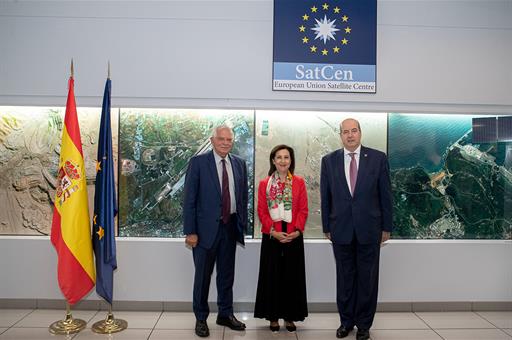At the Torrejón Air Base
The Minister for Defence attends the inauguration of the new building for the European Union's Satellite Centre
News - 2022.9.26
The event also coincides with the 30th anniversary of the EU's geospatial intelligence agency. The visit was also attended by the High Representative of the European Union for Foreign Affairs, Politics and Security, Josep Borrell. The two were received by the centre's Director, Romanian diplomat Sorin Ducaru, with whom they toured the SATCEN facilities, which is key to the protection of European interests and security.
"SATCEN, now configured as an agency for the common security and defence policy, is a fundamental milestone in the process by which the European Union has been equipping itself with instruments that guarantee its strategic autonomy", said the Minister for Defence during a speech in the centre's auditorium, in which she underlined its decisive utility in the decision-making process at EU and Member State level.
Robles, who emphasised the committed support from the President of the Government of Spain for the centre, also congratulated all its staff, and wished them to continue working at their new headquarters with the same success and dedication, "that are a guarantee of security and well-being for all European citizens".
The Minister added that both Europe and Spain would continue to be committed to the values of peace, freedom and security across the world, especially at such difficult times as the current situation in Ukraine, a country to which she expressed her full support.
"The eyes of Europe"
For his part, the High Representative said that, "the future will be written in space", which he described as "the new battlefield".
"These are the eyes of Europe. Through this satellite centre, in Europe, from Brussels, in all the capitals, we see what is happening. Before you decide what to do, you have to know what is going on", Borrell said.
"Space will also be the new frontier for geopolitics. It has acquired a strategic dimension; it has become a congested place. The elements we have there will increase our capacity to be a geopolitical actor. These are the eyes of Europe and we have to share them", he added.
Borrell and Robles visited the operations room, where they were able to see first-hand how mission and operations support works from the centre, based mainly on information from Earth observation satellites. Its services are based on the use of spatial resources and collateral data, such as aerial or satellite imagery.
Operations Director, Epifanio Pecharromán, explained the satellite monitoring of Ukraine. They also learned first-hand about SATCEN's support to Frontex from a humanitarian point of view.
Gema Maza, Team Leader of the Copernicus External Action Support Service, highlighted the example of the evacuation system in Kabul last August, using thematic maps. Daily monitoring was carried out during the crisis.
Diplomatic and operational tool
In the auditorium, the Director of SATCEN thanked the Minister and the High Representative for their presence, and referred to the centre's fundamental mission, which is to contribute to decision-making and initiatives by the EU and the Member States, offering political leaders an early warning service in the event of possible crises, in order to anticipate and be able to take the appropriate measures.
"Over the years, the Satellite Centre has developed a unique training capability to maintain a high level of expertise and professionalism", said Ducaru, stressing that it is a specific example of the EU's strategic operational autonomy.
"It is both a diplomatic tool for implementing EU policies, as well as an operational tool for civilian and military actions", added the Director, who indicated that the expansion of the centre will enable the conditions for further expansion of its activities, to the benefit of the EU, its Member States and its citizens.
Looking ahead, the Satellite Centre is working on implementing emerging and integrated applications, such as the impact of climate change on security, as well as monitoring cultural heritage.
EU geospatial intelligence agency
The Satellite Centre was founded in 1992 as an analysis tool for the WEU (Western European Union). In 2002, it became part of the European Union and is now the EU's geospatial intelligence agency.
Its main mission is to support decision-making at different levels within the EU's Common Security and Defence Policy (CSDP), including support for the various missions and operations that have formed part of this policy, such as IRINI, ATALANTA and EUTM Mali.
The European Union Satellite Centre works under the supervision of the EU Political and Security Committee (PSC) and the direction of the High Representative, and is located within the Torrejón Air Base in Madrid.
Spain has the largest representation in the centre's workforce, accounting for over 45 percent of its 160 employees.
Non official translation





